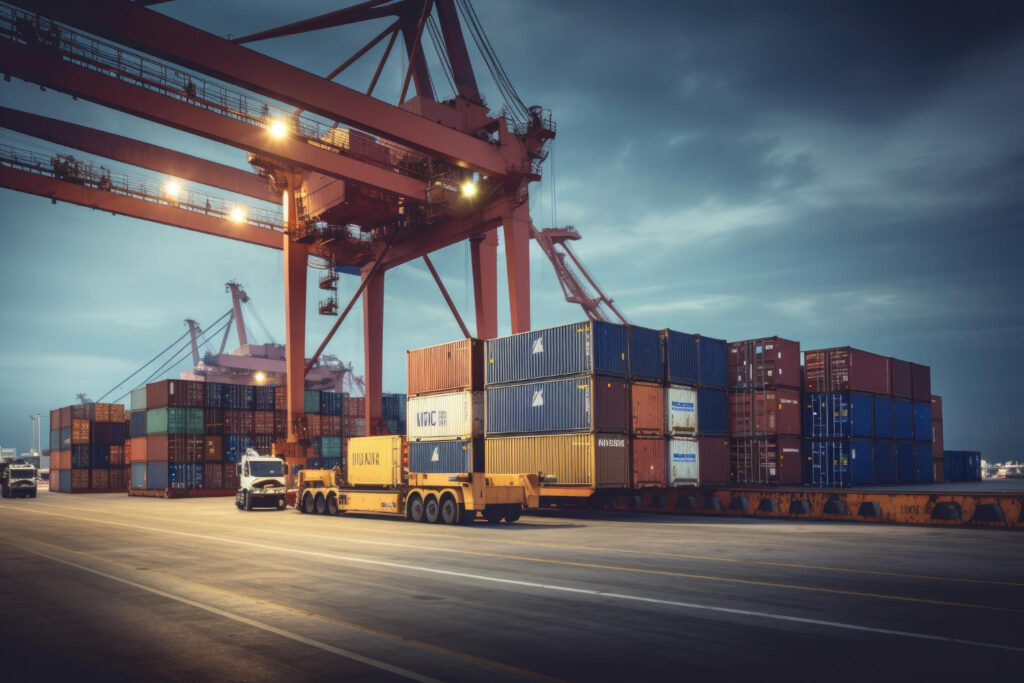Dynamic Routing: Logistics Management Systems can adapt routes in real-time, responding to unexpected conditions like traffic jams or road closures, ensuring timely deliveries and cost efficiency.
Multi-Modal Transportation Support: Iron ore transportation often requires a combination of rail, road, and sea transport. Logistics software can seamlessly integrate these modes, optimizing routes and schedules across different transportation methods.
Efficient inventory management is crucial in iron ore logistics, preventing stockpiles and ensuring a smooth supply chain. Logistics Management Software provides robust tools for inventory tracking and order management.
Real-Time Inventory Tracking: By offering real-time visibility into inventory levels, the software helps companies avoid excess stock or shortages, aligning production with transportation capacities.
Order Management Efficiency: The software facilitates streamlined order processing, allowing for better coordination between procurement, transportation, and delivery, ensuring that customer demands are met promptly and accurately.
Optimal fleet utilization is essential for cost-effective and reliable iron ore transport. Logistics Management Systems offer comprehensive fleet management features that enhance operational efficiency and vehicle longevity.
Vehicle Tracking and Utilization: By monitoring vehicle locations and statuses, the software ensures optimal fleet utilization, reducing idle times and maximizing transport efficiency.
Maintenance Scheduling: Proactive maintenance features help prevent vehicle breakdowns, ensuring the fleet remains operational and reduces unexpected downtime, which can significantly disrupt the supply chain.
Effective communication is pivotal in logistics, where multiple stakeholders must coordinate seamlessly. Logistics Management Software fosters improved collaboration and information sharing among all parties involved.
Centralized Communication Platform: The software provides a unified platform for all communication related to iron ore transportation, from dispatchers to drivers and receiving personnel, enhancing clarity and reducing miscommunication.
Stakeholder Engagement: Real-time updates and transparent information sharing keep all stakeholders informed, enhancing trust and enabling proactive decision-making.
Logistics Management Software is a treasure trove of data, offering insights that drive smarter, data-driven decisions. This analytical capability is instrumental in continually refining and optimizing the iron ore transportation process.
Performance Analytics: The system analyzes transportation data to highlight efficiency gains and areas needing improvement, supporting strategic decision-making.
Forecasting: Advanced analytics can predict trends and potential bottlenecks, enabling logistics managers to make proactive adjustments, optimizing operations, and reducing costs.
Regulatory compliance and sustainability are increasingly important in logistics. Logistics Management Solutions ensure that iron ore transportation adheres to legal standards and environmental guidelines.
Regulatory Compliance: The software helps manage and document compliance with transportation regulations, reducing the risk of legal issues and penalties.
Eco-friendly Routing: By optimizing routes for fuel efficiency and minimizing empty runs, the software contributes to reduced carbon emissions, aligning with sustainability goals.
Every logistics operation has unique needs, and Logistics Management Software often provides customizable and scalable solutions to cater to specific requirements of iron ore transportation.
Customizable Features: The software can be tailored to the specific needs of iron ore transportation, whether it’s handling bulk shipments or managing the logistics of mining operations.
Scalable Solutions: As a company grows or as the industry evolves, the logistics software can scale to accommodate increased demands, ensuring that it remains an effective tool over time.
Choosing the right Logistics Management Software is critical. The selection should be based on the software’s ability to meet the identified needs, its scalability, user-friendliness, and the support provided by the vendor. It’s essential to choose a system that integrates well with existing IT infrastructure and can adapt to future technological advancements or changes in business processes.
For the successful adoption of any Logistics Management Solution, it is crucial to ensure that the staff are adequately trained and engaged. Employees at all levels should understand how the software benefits their roles and enhances the company’s logistics operations. Comprehensive training sessions should be conducted to familiarize users with the system, and continuous support should be available to address any issues or questions that arise during and after implementation.
Implementing the logistics software in phases can be more manageable and less disruptive than a full-scale immediate rollout. Start with a pilot phase in select areas or functions, gather feedback, and make necessary adjustments before a company-wide launch. This phased approach allows for the identification and resolution of any issues in a controlled environment, ensuring that the system is fully optimized before full implementation.
After the implementation, continuous monitoring is crucial to ensure the software is being utilized effectively and delivering the expected benefits. Regular performance reviews and feedback loops should be established to identify areas for improvement. The logistics management system should not be static; it should evolve with the changing needs of the iron ore transportation industry, incorporating new features and updates as necessary.
By following these strategies, companies can maximize the benefits of their Logistics Management Software, enhancing their iron ore transportation logistics to be more efficient, cost-effective, and responsive to market demands.
Taabi is a comprehensive, robust, and AI & IoT-driven, logistics management software designed to revolutionize the industry. Taabi offers a comprehensive suite of solutions tailored to the unique challenges of iron ore transport, leveraging advanced analytics and real-time data to drive decision-making and operational excellence.
Taabi’s intelligent fuel management system is a game-changer for iron ore transportation companies. By monitoring fuel consumption patterns and identifying inefficiencies, Taabi helps businesses reduce fuel costs significantly. The software provides actionable insights, allowing for the adjustment of routes or driving behaviors to optimize fuel usage, thereby enhancing profitability.
Understanding the condition of transportation assets is crucial in the iron ore industry. Taabi’s vehicle health management feature offers a holistic view of each vehicle’s status, predicting potential failures before they occur. Coupled with predictive maintenance capabilities, this feature enables companies to minimize downtime, extend vehicle lifespan, and avoid costly repairs, ensuring that fleets are always in optimal condition.
Taabi excels in optimizing the two critical aspects of logistics: route and payload. Its route optimization algorithm considers various factors like traffic, terrain, and distance to suggest the most efficient paths, reducing travel time and costs. Simultaneously, payload optimization ensures that each vehicle carries the ideal weight, maximizing capacity while adhering to safety standards.
Monitoring driver behavior is vital for safety and efficiency. Taabi’s driver behavior monitoring system provides insights into driving patterns, highlighting areas for improvement. Additionally, the real-time control tower feature offers a comprehensive overview of all transportation activities, enabling managers to make informed decisions, respond to issues promptly, and ensure seamless operations.
Security is a paramount concern in the transportation of valuable commodities like iron ore. Taabi’s digital locking systems offer advanced security features, ensuring that cargo remains secure throughout its journey. These systems provide peace of mind and reduce the risk of theft or tampering, further enhancing the profitability and reliability of iron ore transportation.
Taabi stands out as a modern logistics management system specifically designed for the iron ore transportation industry. Its suite of solutions, including fuel and vehicle health management, predictive maintenance, route and payload optimization, driver behavior monitoring, real-time control tower, and digital locking systems, addresses the myriad challenges faced by the sector. By adopting Taabi, companies can not only achieve operational efficiency but also significantly boost their profitability, marking a new era in the transportation of iron ore.







